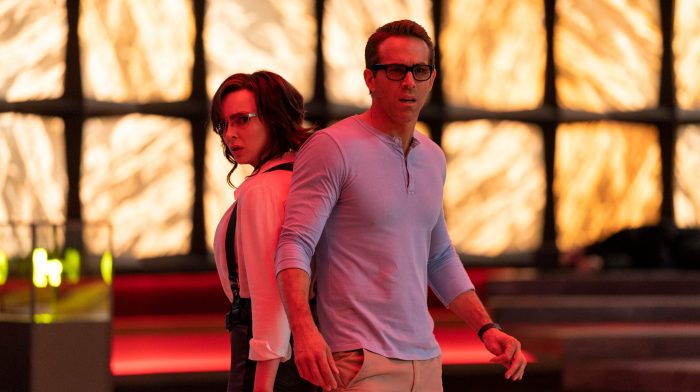
Free Guy is the equivalent of a pop earworm – something a little tinny and artificial that nevertheless worms its way into your brain, whether you want it or not. Which makes it rather fitting that the big emotional crux of the movie is actually based around a pop song. And that the film’s star is epitome of pop likability: smooth, digestible, inoffensive — yes, even with all the curses that roll off his tongue.
Isn’t Ryan Reynolds just so likable? He’s so self-deprecating, he’s so funny, he’s so sarcastic. He loves his wife and making commercials based on viral memes. He’s like one of us! Except he’s not — he’s an extremely handsome millionaire who has formed his celebrity persona around a hit superhero character, and around riffing with other likable, funny stars. And Reynolds plays into that wholesale with Free Guy, a surprisingly wholesome video game movie with a handful of humorous moments and solid performances, that nevertheless feels like it was designed by an algorithm.
Directed by Shawn Levy from a screenplay by Matt Lieberman and Zak Penn and a story by Lieberman, Free Guy at least has the distinction of being one of the best video game movies that Hollywood has managed to churn out, in that it actually understands — and bases its plot around — what makes video games tick. That’s because it’s set in a video game itself.
Reynolds plays Guy, a bank teller who couldn’t be happier to be a bank teller. He wakes up every morning and says hi to his goldfish before picking an outfit from his closet full of blue button-ups. He grabs the same coffee at the same shop, chats with his security guard buddy Buddy (Lil Rel Howery), and tells everyone he meets to “Don’t have a good day, have a great day!” Then his bank gets robbed and he and Buddy nonchalantly drop to the floor in just another part of the daily routine.
Guy lives in Free City, an unusually violent town that is regularly hijacked, bazooka-ed, and destroyed by a group of people Guy and his friends call “the Sunglass People,” who have license to do whatever they want. That’s because the Sunglass People are players of a video game called Free City, an open-world shooter game that is one of the most popular video games in the world. Guy is just an NPC (non-playable character) blithely unaware of the unreality of his existence. That is, until he meets Molotov Girl (Jodie Comer, getting to flex her charming rom-com skills), a sunglasses-wearing warrior who struts in humming his favorite song, Mariah Carey’s “Fantasy.” Instantly falling in love, he is inspired to steal a pair of sunglasses and is shocked to see it reveal that his whole world is a game, and he is now a player. Deciding to be a “good guy” to impress Molotov Girl, Guy becomes an unexpected star of Free City, drawing the negative attention of its greedy creator Antwan (an absolutely unhinged Taika Waititi), who has a checkered history with Molotov Girl’s real-life counterpart Millie, and her former coding partner Keys (Joe Keery).
Free Guy is like The Truman Show fed through an algorithm and repackaged with a little LEGO Movie DNA and Twitch star cameos. But the thing is, it really believes in itself. Where the hero of Ready Player One could barely get out “A fanboy knows a hater” without causing its audience to roll their eyes to the backs of their skulls, there’s a real, beating heart beneath all that plastic packaging of Free Guy. Perhaps it’s the boyish goofiness of Reynolds’ central performance, which is refreshingly, painfully sincere — devoid of any of the self-deprecating shtick that he’s laid on thick in other recent roles. Guy is depressingly naive, of course, but the film never mocks him for his optimism and insistence on “being the good guy” and choosing never to kill, unlike all his sunglasses-wearing compatriots. There’s a nugget of an idea there for a movie about the growing cynicism of the film and video game industries, and how violence and hardened killers are extolled over pacifists. But this is also a Ryan Reynolds action comedy, so you’ve got to have some cool motorcycle shoot-outs.
Free Guy, instead, becomes about the dangers of sequels and franchising, which feels especially ironic when the climax of the film turns into a bonanza of pop culture references and needle-drops. The film is also brought down by how apparent it is that Levy just let the camera run while Waititi riffed (though you can’t really blame him), causing the third act to feel like two separate climaxes stitched together. But apart from Waititi, the film doesn’t fall victim to too much actorly excess — in fact, a third-act surprise appearance by a certain magical actor is a welcome show-stopper.
The thing is, it’s hard to hate a pop song. It’s crowd-pleasing and manufactured yes, but you’ve got to admire the production behind it and the people who worked on it, who might’ve genuinely believed in what they’re doing, beyond making a hit. And Free Guy, for all its cheesy faults, might actually believe in itself.
/Film Rating: 6 out of 10
The post ‘Free Guy’ Review: An Aggressively Optimistic Pop Song of an Action Movie appeared first on /Film.
0 Comments